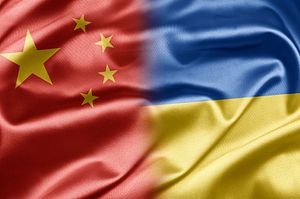U.S. National Security Adviser Susan Rice and Chinese State Councilor Yang Jiechi spoke on the phone today, with the Ukraine crisis at the top of agenda. According to Reuters, a statement from the White House said that Rice and Yang “agreed that the United States and China share an interest in supporting efforts to identify a peaceful resolution to the ongoing dispute between Russia and Ukraine that is based on respect for international law and upholds Ukraine’s sovereignty and territorial integrity.”
The report in Xinhua had a rather different tone. The brief article pointedly did not include the word “agreed.” Instead, the article simply said that “Rice briefed Yang on the U.S. view and position. Yang, for his part, expounded China’s principled stand on Ukraine’s situation.” There’s no agreement implied in Xinhua’s write-up—a marked contrast from statements on Foreign Minister Wang Yi’s conversation with his Russian counterpart. Although China didn’t go quite as far as the Russian Foreign Ministry did in noting the “coincidence of positions,” FM spokesman Qin Gang did mention that “Both believe that a proper settlement of the Ukrainian crisis is of vital importance to regional peace and stability.” The absence of a similar admission of agreement, however anodyne, regarding Rice and Yang’s conversation is telling.
Interestingly, the Xinhua write-up did not even include a mention of China’s support for the Ukraine’s sovereignty and territorial integrity, even though Foreign Ministry spokespeople have previously offered such comments. A March 2 statement by Qin Gang affirmed China’s “respect [for] the independence, sovereignty and territorial integrity of Ukraine.”
Since then, however, this expression of support has disappeared from China’s official remarks. Qin has been asked repeatedly about China’s position on the Ukraine, including at the March 3, March 4, and March 6 press conferences. Despite ample opportunities (including when asked to confirm that this was a point of agreement between Rice and Yang), Qin did not once repeat China’s position of respect for Ukraine’s “independence, sovereignty and territorial integrity.” Instead, China’s Foreign Ministry appears to have switched to expressing support for “the lawful rights and interests of all ethnic communities in Ukraine,” a phrase that appeared both in Qin’s March 6 press conference and the Xinhua write-up of Yang’s conversation with Rice.
It’s interesting that China is backing away from expressing support for Ukraine’s sovereignty and territorial integrity just as Russia seems to be gaining the upper hand in Crimea. On Thursday, the Crimean parliament voted unanimously to join Russia, with a full referendum scheduled to be held within 10 days. If it happens, such a move would be an obvious blow to Ukraine’s territorial integrity. However, since Russia argues that it is moving to protest ethnic Russian populations, the situation would not be cause for alarm under China’s newly adopted position of support for “all ethnic communities” rather than for “territorial integrity.”
China has geostrategic reasons for supporting Russia’s actions in the Crimea peninsula, but doing so goes against China’s core foreign policy principle of “non-interference” as well as its customary insistence on respect for each country’s sovereignty and territorial integrity. As I wrote earlier, the result is that China has refrained from directly backing Russia, but is also carefully avoiding using even customary diplomatic language that might imply China doesn’t support Russia.
Thus, China’s Foreign Ministry Spokesman has repeatedly added qualifiers to expressions of China’s principles. On March 3, he told the press that “With respect to the Ukrainian issue, we uphold China’s long-standing diplomatic principles and basic norms governing international relations, and also take into account the history and complexity of the issue.” On March 6, Qin explicitly said that China’s principles were not the only thing guiding its position on Ukraine: “Our decision is made not only based on our long-standing principles, but also on the cause and effect as well as the merit of the issue.” Given that Chinese state-run media articles place the blame for the Ukraine crisis squarely on the EU and U.S., it’s not hard to extrapolate what China’s consideration of “cause and effect” means for its overall stance.
All countries base their foreign policy decisions on realist concerns rather than solely acting on principle. U.S. support for Ukraine’s new government, for instance, is a happy fusion of U.S. support for democratic movements and its geostrategic interests—but in cases where the two do conflict, as in Bahrain, the U.S. will side with its interests over its principles. It’s not surprising that China is qualifying its non-interference stance to allow Beijing to tacitly support Moscow. What is surprising is the logical quandary China’s Foreign Ministry seems to have gotten itself into by changing its customary rhetoric.
It’s no secret that China’s core principles of non-interference and respect for sovereignty and territorial integrity stem from China’s hope that other countries will accord China the same courtesy. Now China is allowing this position to be softened based on “the history and complexity of the issue.” In addition, China has shifted its public stance from calling for respect for territorial integrity to demanding that the “the legitimate rights and interests of all ethnic groups” be protected.
Why is this dangerous for China? Take these two statements—accounting for historical complexity and the rights of ethnic groups—and apply them to Xinjiang and Tibet. By parroting China’s own logic, Tibetan and Uyghur separatists could make a pretty good case for themselves. For China, it’s particularly dangerous to bend on the principles of non-interference and territorial sovereignty because there are groups who would very much like to alter China’s governance system, and still others who want to split off from the PRC. By complicating its foreign policy stance to accommodate Beijing’s new partnership with Moscow, China could be setting itself up for a giant headache later.

































